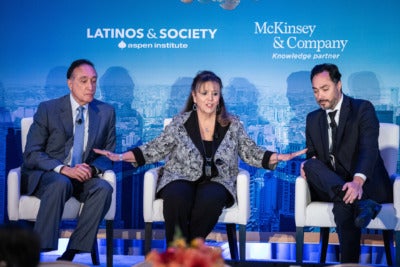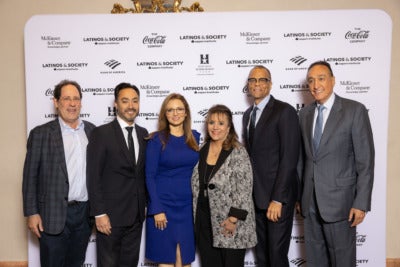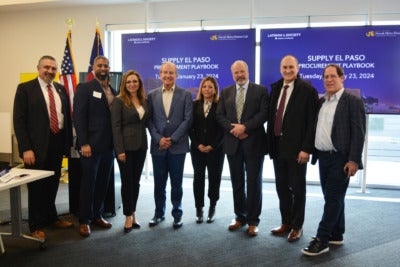Cindy Ramos-Davidson knows a thing or two about making connections.
On a recent Monday morning Ramos-Davidson, president and CEO of the El Paso Hispanic Chamber of Commerce, was at work juggling a laptop, iPad, and desk phone as a freak windstorm threatened to knock her offline. Ramos-Davidson was taking it all in stride, toggling between devices and offices to stay on her call.
Connecting, after all, has been at the heart of her job leading the Chamber for the past 26 years. By pursuing innovative strategies to help connect businesses in the region with procurement opportunities, the Chamber under her leadership has unlocked over $5 billion in economic impact and helped sustain over 21,000 jobs across the region.
Before the vast majority of that impact could happen, though, Ramos-Davidson had to do some connecting herself. “Normally, you have to be a member of the Chamber to get any services,” she says. “When we started years ago, I had to turn people away if they wanted my help, because they had to be a member. And so I had to find a way to still service them, without using Chamber resources.”

Advancing Economic Mobility Summit 2023. Henry Cisneros, Chairman, American Triple I, Cindy Ramos-Davidson, CEO, El Paso Hispanic Chamber of Commerce and Joaquin Castro, U.S. Congressman (TX-20). Photo by Denny Henry.
Ramos-Davidson began pursuing matching grants on federal, state, and county levels which allowed the Chamber to build programs that would be available to the entire community.
“That allowed us to start to work in that procurement space…by virtue of being able to hire specialists who could guide, counsel and provide direct technical assistance. That’s how we created our entrepreneurial technical assistance centers to provide that grassroots support. And what makes us so different is that our trainers live with the business, so we don’t send those businesses away. We live with them through the lifecycle of their contracts.”
El Paso sits across the Rio Grande from Cuidad Juárez, making it the second largest binational metropolitan area on the southern border, behind San Diego-Tijuana. Fort Bliss sits in the northeast corner of town, near the airport, with its U.S. Army tank training grounds extending all the way up to the White Sands missile range in Southern New Mexico, 90 miles away.
While Fort Bliss, school districts, and the various layers of government, military, and healthcare systems provide many local jobs, the backbone of the local economy is small business. For years now the national trend has been for large corporations with multi-state operations to vacuum up procurement contracts, only to hire locally to actually service them. While there’s nothing inherently wrong with that approach, it adds a layer of cost and complexity, and takes the opportunity away from an El Pasoan to be a business owner and job creator.
Today, thanks to the Chamber, more local companies are answering the call when the government needs vendors and contractors to do anything from paving parking lots, to outfitting classrooms with technology, to completing HVAC and plumbing renovations on buildings and campuses.
Though many such contract opportunities exist, navigating them can be overwhelming for small businesses. Procurement, even for basic contracts, is usually a knotty process of paperwork and certification that can frustrate owner/operators and lead to them leaving money and opportunity on the table.

Advancing Economic Mobility Summit 2023. Bruce Katz, Co-Founder and Director, Nowak Metro Finance Lab, Drexel University, Joaquin Castro, U.S. Congressman (TX-20), Domenika Lynch, Executive Director of the Aspen Institute Latinos and Society Program, Cindy Ramos-Davidson, CEO, El Paso Hispanic Chamber of Commerce, Phillip Gaskin, Strategic Advisor to the Office of the President and CEO and Henry Cisneros, Chairman, American Triple I. Photo by Denny Henry.
It was these kinds of contracts Ramos-Davidson was eyeing to bring home to her community when she embarked on building the two technical assistance programs affiliated with the Chamber: the Women’s Business Border Center and the Minority Business Development Center. Their impact has been staggering: The two centers have together counseled over 84,000 businesses since 2003. In 2023 alone, 5,601 businesses went through training hosted by the centers to learn how to successfully bid on these contracts. The Chamber also assists those who want to start a business, even home-based businesses, in particular aiding veterans and service-disabled veterans navigate the process.
And often, when those businesses need their own vendors–a lawyer, or a website designer, for example–Ramos-Davidson can connect them with Chamber members to help out, further keeping dollars circulating in the local economy.

Supply El Paso Procurement Playbook Launch. L to R: Dante Acosta, U.S. Small Business Association, Radhy Miranda, The Rockefeller Foundation, Domenika Lynch, Aspen Institute Latinos & Society Program, Woody Hunt, Hunt Companies, Mirella Craigo, City of El Paso, Mayor Oscar Leeser, City of El Paso, Cary Westin, City of El Paso, Bruce Katz, Nowak Metro Finance Lab. Photo by City of El P
The Chamber’s work in El Paso, and specifically Supply El Paso, is one outcome of the Aspen Institute’s Latinos & Society program which worked closely with Drexel’s Nowak Metro finance Lab to create the Procurement Playbook. The lab is underwritten by Kauffman Foundation and Supply El Paso is underwritten by the Rockefeller Foundation. The Latinos & Society Aspen City Action Lab worked with Ramos-Davidson, her team and other key partners in the El Paso small business ecosystem to create a vision for inclusive growth and an accountable plan of action informed by the Chamber’s success. Even here, Ramos-Davidson is modest. “We wanted to be an asset and not a liability,” she says, of working with the team on their model.
“In the procurement, contracting supply space, it is not something you do overnight, it is gut-wrenching and takes an awful lot of sweat equity, and you’ve got to be in it for the long haul. And your return on investment is not right away. It takes a while.”
The Chamber’s programs have by almost any measure been a success. Yet the numbers show that there is much more work to be done. Data recently compiled by the Aspen Institute reveals that only 3 out of every 10 dollars in local and federal contracts go to firms located in El Paso County. Imagine what that figure might be without twenty years of action by the Chamber. Imagine what the impact on El Paso could be in another twenty years, as Ramos-Davidson, the Chamber, and the two centers keep working to build up entrepreneurship and small businesses poised to seize the opportunity presented by procurement.
The example of the El Paso Hispanic Chamber of Commerce shows what can happen when an institution innovates to solve a problem. The Chamber didn’t have to find a way to help out non-members, but Ramos-Davidson knew that doing so would be a positive that would impact not just Chamber members, but the entire local economy. And that in turn has now helped inform a model being developed for cities with significant Latino populations across the country.
The Aspen Institute is working to bring the Chamber and other leading institutions in the community together to build a Procurement Playbook to further coordinate among the area’s largest employers, government, and research institutions. Not only is the Chamber’s model one worth copying, it’s one worth learning from, supporting, and expanding, for communities all around the country.

